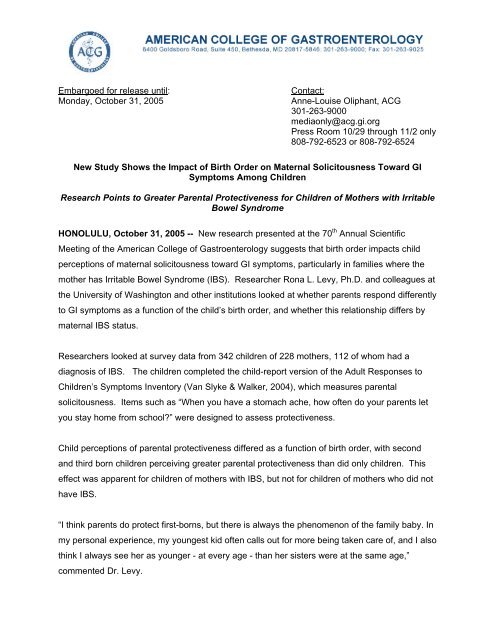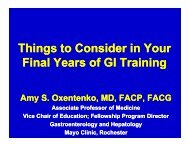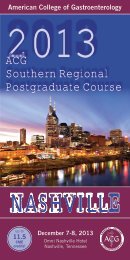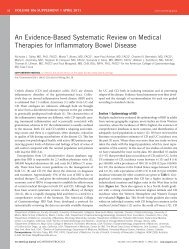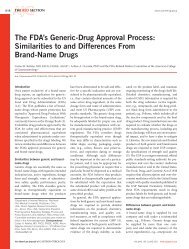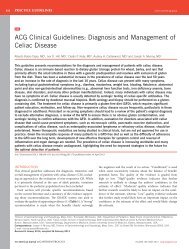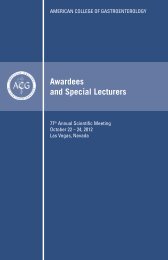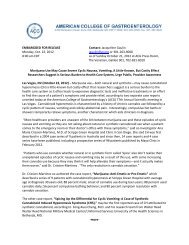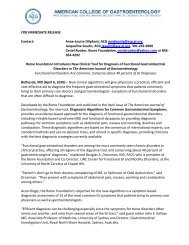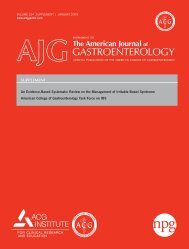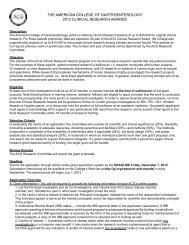Embargoed for release until:
Embargoed for release until:
Embargoed for release until:
You also want an ePaper? Increase the reach of your titles
YUMPU automatically turns print PDFs into web optimized ePapers that Google loves.
<strong>Embargoed</strong> <strong>for</strong> <strong>release</strong> <strong>until</strong>:<br />
Monday, October 31, 2005<br />
Contact:<br />
Anne-Louise Oliphant, ACG<br />
301-263-9000<br />
mediaonly@acg.gi.org<br />
Press Room 10/29 through 11/2 only<br />
808-792-6523 or 808-792-6524<br />
New Study Shows the Impact of Birth Order on Maternal Solicitousness Toward GI<br />
Symptoms Among Children<br />
Research Points to Greater Parental Protectiveness <strong>for</strong> Children of Mothers with Irritable<br />
Bowel Syndrome<br />
HONOLULU, October 31, 2005 -- New research presented at the 70 th Annual Scientific<br />
Meeting of the American College of Gastroenterology suggests that birth order impacts child<br />
perceptions of maternal solicitousness toward GI symptoms, particularly in families where the<br />
mother has Irritable Bowel Syndrome (IBS). Researcher Rona L. Levy, Ph.D. and colleagues at<br />
the University of Washington and other institutions looked at whether parents respond differently<br />
to GI symptoms as a function of the child’s birth order, and whether this relationship differs by<br />
maternal IBS status.<br />
Researchers looked at survey data from 342 children of 228 mothers, 112 of whom had a<br />
diagnosis of IBS. The children completed the child-report version of the Adult Responses to<br />
Children’s Symptoms Inventory (Van Slyke & Walker, 2004), which measures parental<br />
solicitousness. Items such as “When you have a stomach ache, how often do your parents let<br />
you stay home from school” were designed to assess protectiveness.<br />
Child perceptions of parental protectiveness differed as a function of birth order, with second<br />
and third born children perceiving greater parental protectiveness than did only children. This<br />
effect was apparent <strong>for</strong> children of mothers with IBS, but not <strong>for</strong> children of mothers who did not<br />
have IBS.<br />
“I think parents do protect first-borns, but there is always the phenomenon of the family baby. In<br />
my personal experience, my youngest kid often calls out <strong>for</strong> more being taken care of, and I also<br />
think I always see her as younger - at every age - than her sisters were at the same age,”<br />
commented Dr. Levy.
Earlier research by Dr. Levy published in 2004 in the American Journal of Gastroenterology<br />
found that children whose mothers made solicitous responses to illness complaints<br />
independently reported more severe stomach aches, and they had more school absences <strong>for</strong><br />
stomach aches, but solicitous behavior did not significantly impact non-GI symptom reporting,<br />
clinic visits or school absences. 1<br />
Given the established relationship between parental solicitousness and child disability, later<br />
born children may be at increased risk <strong>for</strong> such negative outcomes, particularly later born<br />
children of IBS mothers.<br />
According to Shelby L. Langer, Ph.D., the lead author, “Future research is needed to examine<br />
how parents respond to children in a more ‘protective’ but potentially problematic way. Wellintended<br />
protectiveness may actually rein<strong>for</strong>ce illness behavior rather than wellness behavior.<br />
As a result, children could miss more school or report more symptoms.”<br />
About the American College of Gastroenterology<br />
The ACG was <strong>for</strong>med in 1932 to advance the scientific study and medical treatment of disorders<br />
of the gastrointestinal (GI) tract. The College promotes the highest standards in medical<br />
education and is guided by its commitment to meeting the needs of clinical gastroenterology<br />
practitioners. Consumers can get more in<strong>for</strong>mation on GI diseases through the following ACGsponsored<br />
programs:<br />
• 1-800-978-7666 (free brochures on common GI disorders, including ulcer, colon cancer,<br />
gallstones, and liver disease)<br />
• 1-866-IBS-RELIEF and www.ibsrelief.org (free educational materials)<br />
• 1-800-HRT-BURN (free brochure and video on heartburn and GERD)<br />
• www.acg.gi.org (ACG’s Web site)<br />
###<br />
1 AmJGastroenterol 2004;99:1-10


